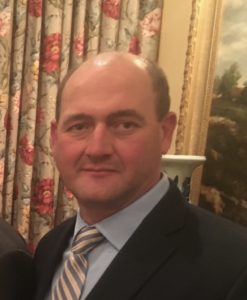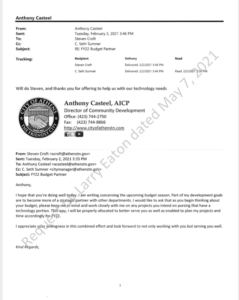A citizen’s lawsuit against the city of Athens and its city manager takes aim at multiple potential violations of the open meetings and public records laws.
The lawsuit by Larry Eaton challenges:
- The lack of minutes kept for two special called meetings involving the temporary suspension of the city manager, C. Seth Sumner;
- The hours it took to redact copies of public records, the assignment of top-paid staff to do the redactions, and the resulting charges for that labor; and
- An unusual practice of “watermarking” all copies of records given to the Eaton, altering them with diagonal gray script across the length of the record that says “Requested by Larry Eaton dated…”
Eaton, a resident of Athens, is asking the court to permanently enjoin the city from continuing to violate the open meetings law, to force the city to adopt policies on public records consistent with the public records law and to cease violating his rights through “frivolous denials, delays, harassment, and targeting…”
No court date has yet been set, but the city is expected to file a response brief sometime in May. Eaton is represented by Andrew Bateman with Rogers Sauceman, PLLC.
Other articles about the lawsuit:
-
- Athens, Tennessee, man sues over $54-an-hour charge for city manager to respond to records requests (Chattanooga Times Free Press)
- Lawsuit alleges misconduct by Sumner, City of Athens in regard to public records (Daily Post Athenian)
No minutes for meetings involving city manager suspension
On Oct. 22, 2021, Eaton asked the city attorney about charges against the city manager that warranted a two-week suspension given during an October City Council meeting. The city attorney replied that Eaton was at the meeting, which was live-streamed to the public, and that minutes “will eventually be generated and approved.”
On Dec. 6, 2021, Eaton officially requested copies of the minutes of the two relevant City Council special meetings on Aug. 10, 2021, and Oct. 8, 2021, including the “specific charges that were warranted for the two-week suspension of C. Seth Sumner that the city council voted on in the 2nd part of the special called meeting.”
He was told on Dec. 14, 2021, by the city’s clerk, Leslie McKee, that while she was responsible for preparing the minutes of these meetings, no minutes had been prepared. Once they were prepared, they would be posted on the city’s website, she said. (As of May 5, 2022, the minutes for those meetings have not been posted to the city’s website.)
Eaton observes in his lawsuit that minutes for other subsequent City Council meetings have since been prepared and approved. He contends that the city has “failed to prepare and approve the minutes of the two meetings in question, as the meetings in question were embarrassing and problematic for the City and/or Sumner.”
The Open Meetings Act says that minutes of governing body meetings “shall be promptly and fully recorded, shall be open to public inspection, and shall include, but not be limited to, a record of persons present, all motions, proposals and resolutions offered, the results of any votes taken, and a record of individual votes in event of a roll call.”
City manager personally redacts records, resulting in high labor charges
Eaton also alleges the city has violated the public records law regarding charges for costs of copies.
The city in December 2020 charged Eaton $741.20 for credit card statements for cards controlled by the city manager, reflecting redaction costs. Then in May, 2021, Eaton asked for some of the city manager’s emails. He was charged $209.69 for the emails, which were heavily redacted.
“It is unreasonable, and a violation of the promulgated ‘schedule of reasonable charges’ for Sumner, the highest paid City employee, to be the one personally completing the redaction of these records,” Eaton contends in the lawsuit. The Schedule of Reasonable Charges developed by the Office of Open Records Counsel says: “A records custodian shall utilize the most cost efficient method of producing requested records. Accordingly, a records custodian should strive to utilize current employees at the lowest practicable hourly wage to fulfill public records requests for copies.”
“By refusing to allow other staff members to complete the redaction, Sumner intentionally acted to artificially increase the cost to Eaton of obtaining these records,” the lawsuit says.
Eaton also said he would introduce evidence he obtained later through public records that will show that Sumner was not working on the public records request for emails during the time periods he said he was in the cost breakdown given to Eaton.
“…Sumner was actually using the telephone, sending and receiving text messages, wandering city hall, speaking with other City employees, and participating in unrelated Zoom meetings.”
City puts watermark across copies of public records requested by Eaton
The city also in 2020 began to add a watermark across copies of public records provided to Eaton.
Eaton says that the watermark is not standard practice or policy for records requests with the city. He describes how he asked for any public records related to the watermarking, to which the city replied they had no responsive records.
He was eventually informed by the city clerk that no written policy on watermarking existed but “this policy was verbally transmitted to me.”
Eaton says he believes that the city manager director the city clerk and other city employees to place a watermark on records he requested “as a form of harassment and intimidation, and for Sumner’s personal gain, and the gain of the City.”
He notes that all of his records requests are routed through the city manager, a practice not followed for requests by other citizens.





